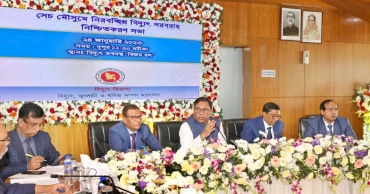Power Division
Power Division to investigate grid failure that hit southern districts
The Power Division has formed a 7-member inquiry committee to investigate the grid failure that led to a blackout across 21 out of the country's 64 districts, all in the southern region under Barisal and Khulna divisions.
Energy Advisor Dr M Fouzul Kabir Khan announced the formation of the probe body, to be led by Pro-Vice Chancellor of Bangladesh University of Engineering and Technology (BUET) Prof Abdul Hasib Chowdhury.
The inquiry committee was asked to submit its report and recommendations within the next 7 working days.
The other members of the committee include Prof of Mechanical Engineering Department of BUET Dr Md Ehsan, Divisional Commissioner of Md Firoz Shah of Khulna, Member (P& D) of Bangladesh Rural Electrification Board and Chief Engineer of West Zone Power Distribution Company.
Addressing a press briefing at the Power Division said the committee will also look into the matter as to why the recommendations of a committee formed last in 2014 following a nationwide grid failure were not implemented.
He said the technical fault in the grid did not affect the entire country because of some measures taken up by different organisations including BPDB and PGCB.
Responding to the question he said that this year there might be some load shedding. But that power cut will always remain within a tolerable level.
“We hope the power generation will be approximately 16,500 MW against a demand of 18,000 MW,” he added.
Load-shedding to be spread equally across rural and urban areas: Energy Adviser
He admitted that in some areas there are reports of power outages. “But those occurred due to technical fault or for other reasons, not for the generation shortfall.”
He also informed that another inquiry committee was formed by the Road Transport Ministry to investigate the incident of power failure in operation of the Metro Rail in Dhaka.
“That power utilities which supply electricity to Metro Rail were not responsible. The fault caused by the Metro Rail system,” he added.
10 months ago
No headway in taking Dhaka’s internet, satellite TV overhead cables underground
Despite repeated efforts by the Power Division, no progress has been made in bringing the distressing overhead internet and satellite TV cables underground although power utilities are implementing their project in this regard.
It has even not possible to make the operators of internet and satellite TV cables agreed to join the ongoing underground cabling projects of the power utility bodies.
According to official sources, Dhaka Power Distribution Company Limited (DPDC) has been implementing its first project in the Dhanmondi area to take its all overhead transmission lines underground.
“But despite repeated calls by the DPDC, no internet or TV cable operator agreed to join the project. They were even offered free of cost to join the scheme. But no response was received,” a top official of the Power Division told UNB.
In such a frustrating situation, recently the Power Division reconstituted its previous committee and also convened a meeting to find a solution to it. But finally the meeting was not held for unknown reasons.
Dhaka’s air quality 3rd worst in the world this morning
Member secretary of the reconstituted committee and director of the Power Cell Md. Salim Ullah Khan informed that the power Division’s efforts will continue.
“But the other departments and agencies are not interested in cooperating with the Power Division’s efforts in this regard,” he told UNB.
Sources at the Power Division blamed the Nationwide Telecommunication Transmission Network (NTTN) and internet service providers (ISPs) for the horrible situation of the overhead cables.
After a number of meetings, the previous committee of the Power Division found it difficult to address the problem without their cooperation.
According to its report submitted to Power Division, Summit Communications Limited (SCL) and Fiber@Home (FAH) have been working as NTTN in the city and they laid underground cables for operating their main internet network in the city while some 1734 legal and some 5,000 illegal internet service providing (ISP) companies have been operating as local ones to provide internet connections to homes and offices through overhead cables.
As per the system, the ISPs are supposed to take connections from SCL and FAH to take internet service to homes and offices from the main network. Recently, Bahon Limited, another NTTN company, also joined the network.
But NTTN companies alleged that the ISPs are not taking connections from Label Distribution Protocol (LDP) or Access Point (AP) installed by NTTN as it will cost them financially, says the report.
Rains likely in parts of Dhaka, 7 other divisions
On the other hand, the report reveals, the IPS companies alleged that they do not prefer taking connections from LDP or AP as they do not get required and instant solutions from the NTTN companies if any problem takes place in any internet service connection.
Besides, the NTTN are charging excessively in providing connections to the ISP companies from their LDP and AP, the report mentions quoting the ISP companies.
Under the circumstances, the ISP companies are hanging overhead cables indiscriminately and giving connections to homes and offices without following any rule or regulation, the report says, adding that only the Bangladesh Telecommunication Regulatory Commission (BTRC) can step in and resolve the conflict.
Finally, the committee adopted an 11-point recommendation to have a solution and take all overhead cables underground through coordination with electricity distribution companies —DPDC and Desco.
The committee found that the haphazardly hanged internet, security and satellite TV cables are not only posing a great threat to the power distribution system, but also creating a major obstacle to the government’s move for the beautification of the capital.
Rashed Amin Biduyt, an official of the Bahon Limited, said they are not joining the DPDC underground cabling project due to technical reasons as it will not fulfill its requirements to facilitate connections to ISPN.
"But we're laying our own cables underground with the permission of the South City Corporation," he said.
Read more: Installation of underground cables completed in Hatirjheel area
1 year ago
Power Division ranked first, Energy and Mineral Resources third in APA implementation
The Power Division has grabbed the first position while the Energy and Mineral Resources has ranked third in the implementation of the Annual Performance Agreement (APA) with the government for the financial year-2022-2023.
Congratulating both the Divisions of the Power, Energy and Mineral Resources, State Minister for Power, Energy and Mineral Resources Nasrul Hamid has said that they have to improve the quality of their services further for the power and energy consumers.
Editors' Council condemns attacks on journalists
“You have to reach the services to the doorstep of the customers”, he told the officials of the two divisions.
He said it is essential to take up a pragmatic action plan to explore the primary sources of energy. There should be coordination between the power distribution and transmission segments.
ILO Governing Body to hold 349th session in Geneva from Oct 30 to Nov 11
Urging continuation of the team efforts, he said making prompt decisions can yield good results in the performance.
It is mentionable that among the 52 ministries and divisions of the government the Power Division obtained 99.96 marks out of 100 in the APA implementation to become the first entity in the ranking while Energy and Mineral Resources Division received 99.43 marks to become third.
Several restaurants, including Bangladeshi-owned, in the UK losing license for employing undocumented workers
According to the ministry, the point analysis showed that the Power Division obtained 70 marks out of 70 in its own activities while it got 29.96 marks out of 30 in the case of good governance and reforms related activities.
2 years ago
16,000 MW: Forecast of possible electricity demand during upcoming irrigation season
The demand for electricity in the coming irrigation season could be as high as 16,000 MW -substantially above last year's peak demand of 14,782 MW.
This was estimated and informed in an inter-ministerial coordination meeting, convened by the Power Division on Tuesday. Currently, the installed power generation capacity is more than 25,000 MW. However the sector has been struggling to generate even half the capacity due to fuel shortage.
Read more: BPC opens control room to monitor smooth supply of diesel farmers for irrigation
Presiding over the meeting, State Minister for Power, Energy and Mineral Resources Nasrul Hamid said that power supply will be ensured on priority basis during the irrigation season.
"If there is any possibility of a power shortage, distribution companies will have to deal with the matter in an alternative way," he directed the officials of the power sector.
The irrigation season begins in February and ends on May 31 each year, and during that time, demand is bumped up excessively.
The meeting was informed that for this year's irrigation season, some 4,65,456 irrigation pumps will be connected to water the fields, which will consume an extra 2,400 MW compared with the normal demand.
It discussed the measures taken to enhance the supply of gas, furnace oil, and diesel to increase power generation and priority-basis gas supply to gas-fired power plants to ensure uninterrupted power generation.
Read more: Govt to spend Tk. 226 crore to expand irrigation facilities in Sylhet to boost production
The officials of the Bangladesh Power Development Board (BPDB) were asked to ensure smooth transportation and supply of imported petroleum fuels to the power plants through communication with Road Transportation Ministry, Railway Ministry, Roads and Highway Department, Bangladesh Inland Water Transport Authority (BIWTA), Bangladesh Petroleum Corporation, Petrobangla and Barapukuria Coal Mining Company.
They were also directed to repair transmission and distribution lines and ensure at least 2 months' storage of fuel for power generation at the power plants and also form monitoring teams.
Power secretary Habibur Rahman, BPDB Chairman Mahbubur Rahman, BREB chairman Selim Uddin, Petrobangla chairman Ganendra Nath and Power Cell director general Mohammad Hossain were present at the meeting.
3 years ago
Adani’s 750 MW power to come to national grid in March: Nasrul Hamid
The electricity of Indian Adani Group’s Jharkhand power plant will cost Tk 22 per unit as import to Bangladesh is expected to start from March this year, according to a Power Division media statement issued on Tuesday (January 03, 2023).
State Minister for Power, Energy and Mineral Resources Nasrul Hamid visited the Jharkhand power plant on Tuesday.
Power secretary Habibur Rahman and BPDB chairman Mahbubur Rahman accompanied the state minister during the visit.
During the visit, Nasrul told reporters that Bangladesh will receive the electricity from March this year for which a dedicated transmission line has been installed.
Read more: The Tk 700 crore per month hole in the deal with Adani Power
“Power import from the Adani’s Jharkhand plant will be possible from March”, a Power Division media statement quoted him as saying.
“Initially we’ll get about 750 MW from the plant. We need more electricity to meet our demands in the coming summer”, it said.
Adani's Jharkhand coal-fired power plant will have a total of 1,600 MW capacity from two units, each having 800 MW.
“We’re looking for alternative sources of energy. We’ve been working giving priority on uninterrupted power supply at affordable prices”, Nasrul said.
Read more: Introduce smart management system in power grid: Nasrul Hamid
The Adani Group, very close to Indian Prime Minister Narendra Modi, set up the 1600 MW power plant in India’s eastern state of Jharkhand under a deal signed on November 5 in 2017 to export its entire electricity to Bangladesh.
Power Grid Company of Bangladesh (PGCB) constructed two substations at Chapainawabganj and Bogura in Bangladesh and also a transmission line to import the electricity.
Meanwhile, officials of the BPDB are concerned about the tariff of the imported electricity from the Jharkhand plant as its cost will be almost double of the electricity to be generated from locally installed Payra power plant, a joint venture of Bangladesh and China.
They said Bangladesh will incur a huge financial loss to the tune of about Tk 700 crore per month, once it starts importing electricity from the Adani 1,600 MW thermal power plant in Godda, Jharkhand state - due to the ‘flawed’ deal the government signed with the private Indian company.
Read More: Pay production cost to get smooth supply of gas, electricity: PM Hasina tells industries
“Including the cost of coal and its transportation, we have to pay Tk 2,100 crore per month to import 1,600 MW from Adani's plant at a 75 percent plant factor considering the existing rates of coal in the international market," a top official of the state-owned BPDB told UNB.
If some rules and provisions observed in other similar deals (from the private sector, coal-fired) had been maintained here, the cost could have been kept down to Tk 1400 crore per month. The country has to count a loss of about Tk 700 crore per month, working out to Tk 8400 crore annually for the flaws in the deal, he added.
Over the project’s life cycle of 25 years, the loss in terms of the increased cost and hidden components in the tariff Bangladesh will ultimately incur Tk 2.10 lakh crore - a third of the national budget - considering the current coal price, the senior official noted.
The BPDB official said the lack of a provision for discounts in the purchase of the coal that will be used to fuel the plant is an oversight, considering such a provision was made mandatory in other deals that Bangladesh signed with independent power producers (IPP), where the price of coal to be purchased was kept as “pass-through”.
Read More: Ensuring access to electricity at an affordable cost is govt’s prime goal: PM’s Energy Advisor
Explaining the matter, he said Adani will purchase the coal for its power plant as primary fuel and Bangladesh will pay the price of the coal.
Normally, the coal price is calculated on the basis of the Newcastle Price Index, and if any company purchases coal at a higher quantity with higher calorific value, then it gets upto 55 percent discount on the bulk value.
This was the provision kept in the power purchase deal from the 1320 MW Payra power plant, a joint venture project of Bangladesh and China, where BPDB is benefiting from the discount in the price of coal.
“But BPDB will not get any discount in coal price which ultimately pushes up the electricity tariff from the Adani plant by at least 50 percent,” said the official who has been involved in handling the project from BPDB.
Read More: Electricity generation disrupted as Kaptai Lake’s water level decreasing
As a result, if the price of electricity from Bangladesh's Payra Power Plant is calculated at Tk 12-13 per unit including the cost of coal, the price of per unit electricity from Adani plant will be about double at Tk 20-22 per unit, he added.
3 years ago
Power Division receives 'Digital Bangladesh Award 2022'
Power Division has obtained the 'Digital Bangladesh Award 2022' for its implementation of Enterprise Resource Planning (ERP).
In presence of Prime Minister Sheikh Hasina at a function at Bangabandhu International Conference Center on Monday, secretary Habibur Rahman received the awards from State Minister for Information and Communication Technology (ICT) Zunaid Ahmed Palak.
Read: Drinkwell Bangladesh receives US Award for Corporate Excellence 2022
According to the Power Division, it was selected for the award for ensuring efficiency, transparency and accountability in the power sector and as well as improving the quality of customer service.
Minister of State for Power, Energy and Mineral Resources Nasrul Hamid on this occasion said the Power Division has been increasing the use of technology to provide services to the doorsteps of the people.
Because of the ERP implementation, it was possible to make quick decisions, reduce costs, ensure transparency and accountability in the power sector, he said, adding that the review of the performance, free exchange of information, and ensuring the security of information was its obvious result.
He noted that the ERP has been successfully implemented for the first time in the power sector at the government level which will encourage other sectors to follow the path.
Read: FY22: Walton Plaza scoops up highest VAT payer award in business category
He also said that this technology will play an effective role to face future challenges in the power sector.
Earlier the Power Division had received the 'Independence Award-2022' in recognition of its contribution to the socio-economic development of the country and also for successful completion of cent percent electrification in the Mujib year.
The Power Division undertook the initiative in October 2018 to implement the ERP in the division as well as in its 15 subordinate bodies for improving efficiency, expediting the automation process, and bringing pace in budget and cost management.
Ensuring accountability and reaching reliable power supply to the people and achieving customer satisfaction were among the other goal of the ERP initiative, said the Power Division.
3 years ago
Cyclone Sitrang: Power distribution, transmission entities asked to open control rooms
Power Division has asked its all subordinate bodies – in power transmission and distribution segments – to open control rooms in their respective offices as Cyclone Sitrang approaches.
In an office order issued on Monday, all the organisations in power transmission and distribution were directed to open control rooms to take measures and asses any damage by Cyclone Sitrang, and inform the Power Division.
Read: Cyclone Sitrang: Nothing much to worry, says State Minister Enamur
3 years ago
Pay due bills or have power lines disconnected: Power Division to city corporations
Power Division or any distributing entity will not take responsibility if any accident occurs when city corporations or municipalities illegally connect their networks to electricity lines.
Such a warning was issued by the Power Division through a Facebook post today, mentioning an incident in the West Zone Power Distribution Company Limited (WZPDC) area.
The post said that WZPDC served a notice on September 7 to city corporations and municipalities under its areas to pay due electricity bills by September 18. If city corporations fail to do so, WZPDC would disconnect power lines as per Article 18 (1) of the Electricity Act 2018.
Following the WZPDC notice, 75 connections of those city corporations and municipalities, which failed to pay due bills within the stipulated time frame, were disconnected.
Also read: Nasrul seeks JICA’s help in modernising power-gas transmission, distribution in south-western region
Tk 3.34 crore was realised as due bills from 16 city corporations and municipalities.
However, it is being observed with great concern that some of the city corporations and municipalities are reconnecting their networks illegally with the power lines without communicating with WZPDC, the distribution company noted.
“During these reconnections, if any accident occurs, the Power Division or its distribution company will not take responsibility,” said the Power Division.
“Legal action will be taken against such illegal and unlawful reconnections of power lines without paying the outstanding bills,” it noted.
The Power Division also mentioned that Prime Minister Sheikh Hasina directed in the meeting of the Executive Committee of the National Economic Council (ECNEC) on June 1 to disconnect power lines if any customer does not pay the outstanding electricity bill even after receiving a notice.
Also read: Nasrul Hamid urges World Bank to expedite funding for power, energy projects
Following the directive, all distribution companies under the Power Division were instructed to take necessary measures by issuing notices to the consumers having due electricity bills.
3 years ago
Power Division, USAID sign agreement to cut carbon emissions
The Power Division and the United States Agency for International Development (USAID) have signed a memorandum of understanding (MoU) to cut carbon emissions in Bangladesh, helping ensure the country's energy security.
Power Division Deputy Secretary Nirodh Chandra Mandol and Rebecca Robinson, acting director of the Economic Growth Office of the USAID, signed the MoU in Dhaka Sunday to implement the project "Bangladesh Advancing Development and Growth Through Energy (BADGE)."
Under the project, $17.2 million will be spent to cut carbon emissions in the country, Power Division Secretary Habibur Rahman said.
Read: AIBL signs agreement with Padma Diagnostic
According to the Power Division, the project will also help increase the cooperation between the private sector and educationists in reducing carbon emissions.
The BADGE project will also help improve regulatory oversight of energy systems by creating transparent and efficient energy markets, it added.
Power Division Additional Secretary Md Mohsin Chowdhury, Bangladesh Power Development Board Chairman Mahbubur Rahman and Power Cell Director General Mohammad Hossain also spoke at the event.
3 years ago
Power Division hands over Independence Award to PM
The Independence Award won by the Power Division has been handed over to Prime Minister Sheikh Hasina for her visionary leadership in reaching electricity to every house of the country in the Mujib Year.
The Power Division on Thursday was given the Independence Award-2022, the highest state honour, in recognition of its remarkable success to bring 100 per cent of the country under electricity coverage by increasing the daily power generation capacity to 25,512 MW.
Read:PM distributes Independence Award to 9 people, 2 organisations
State Minister for Power, Energy and Mineral Resources Nasrul Hamid received the award from the PM at the award-giving ceremony at the Prime Minister’s Office.
Later on Thursday, the state minister handed over the prestigious award (medal and certificate) to the prime minister, who is also in charge of the power, energy and mineral resources ministry, said PM’s Assistant Press Secretary MM Emrul Kayas on Friday.
The power sector officials said it was possible to bring the entire country under electricity coverage thanks to Hasina’s visionary leadership, policy and strategy. “She is the architect of this glorious achievement,” they said.
The prime minister earlier announced that every house of the country will be illuminated in the Mujib Year.
Read:Eleven chosen for Independence Award 2022
Since taking over the responsibility of the power ministry the PM has directly led the work to accomplish the goal of lighting up every house. So, she deserves this honour, they said.
PM’s Power, Energy and Mineral Resources Affairs Adviser Dr Tawfiq-e-Elahi Chowdhury, PM’s Principal Secretary Dr Ahmad Kaikaus and Power Division Secretary Md Habibur Rahman were present on the occasion.
3 years ago


















